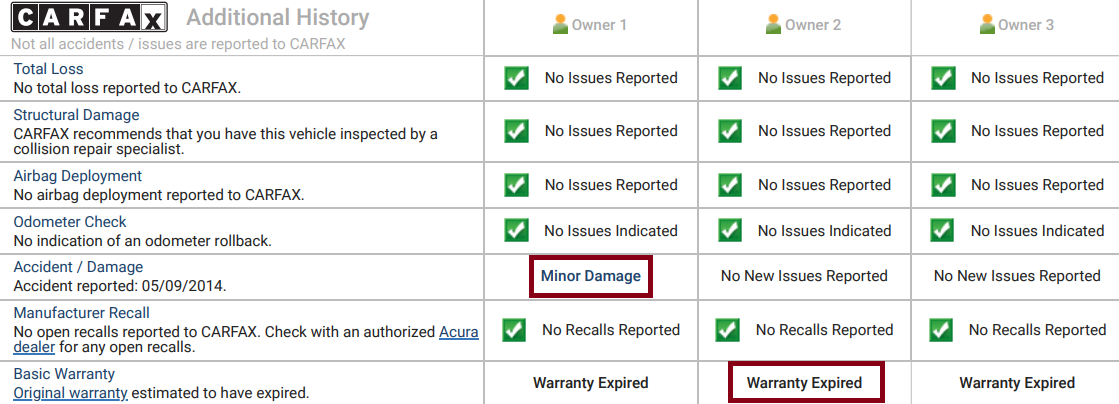Understanding a CARFAX Report: What to Look For
February 1, 2021
I am a serial entrepreneur and a consumer advocate. When I’m not helping car buyers, I love working on ventures that have a positive impact. I run a cause marketing agency and serve on the board of Vayu Global Health where we are disrupting the medical industry and preventing the needless deaths of mothers and babies during childbirth.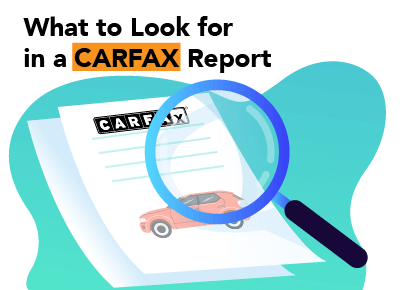

You should never purchase a used car without a vehicle history report.
When it comes to vehicle reports, CARFAX is one of the most well-known and widely used resources. CARFAX relies on 24 billion records to generate its reports.
Understanding a CARFAX report will help you answer some of the questions you should ask when buying a used car.
Table of Contents
- What is a CARFAX Report?
- How Much Does a CARFAX Report Cost?
- History-Based Value Report
- What Is On a CARFAX Report?
- Ownership History
- Title History
- Additional History
- Detailed History
- What Are Some Red Flags in a CARFAX Report?
- What Are Some CARFAX Alternatives?
- Best Car Deals by Category
- Frequently Asked Questions
What is a CARFAX Report?
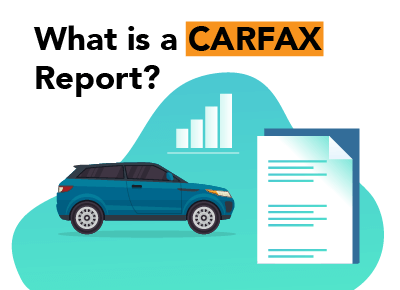 A CARFAX report is a vehicle history report. It will include a vehicle description, accident details, mileage verification, recall checks, and the number of previous owners. The report is generated via information reported to CARFAX from a wide variety of sources, and it can help you make an informed purchasing decision.
A CARFAX report is a vehicle history report. It will include a vehicle description, accident details, mileage verification, recall checks, and the number of previous owners. The report is generated via information reported to CARFAX from a wide variety of sources, and it can help you make an informed purchasing decision.
How Much Does a CARFAX Report Cost?
CARFAX is a highly trusted resource for vehicle history reports, but it is also a bit pricey. One report on CARFAX costs $39.99, or you can pay $59.99 or $99.99 for three or six reports, respectively.
History-Based Value Report
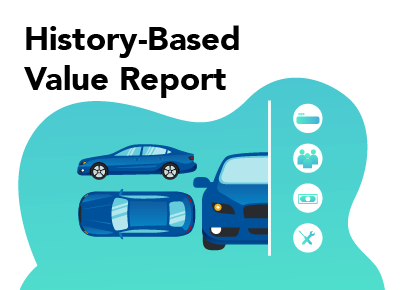 CARFAX offers a free History-Based Value tool to help you determine how much you should pay for a particular vehicle. The report relies on the vehicle's VIN, and it is based on the vehicle's make, model, mileage, condition, and location.
CARFAX offers a free History-Based Value tool to help you determine how much you should pay for a particular vehicle. The report relies on the vehicle's VIN, and it is based on the vehicle's make, model, mileage, condition, and location.
Additionally, the report will factor in the number of owners, service history, and the number of accidents into account. Using the History-Value Report, you can get a reasonable idea of how much your vehicle is worth when buying or selling.
In this sample CARFAX report, we can see a quick snapshot of the vehicle price ($9,860).
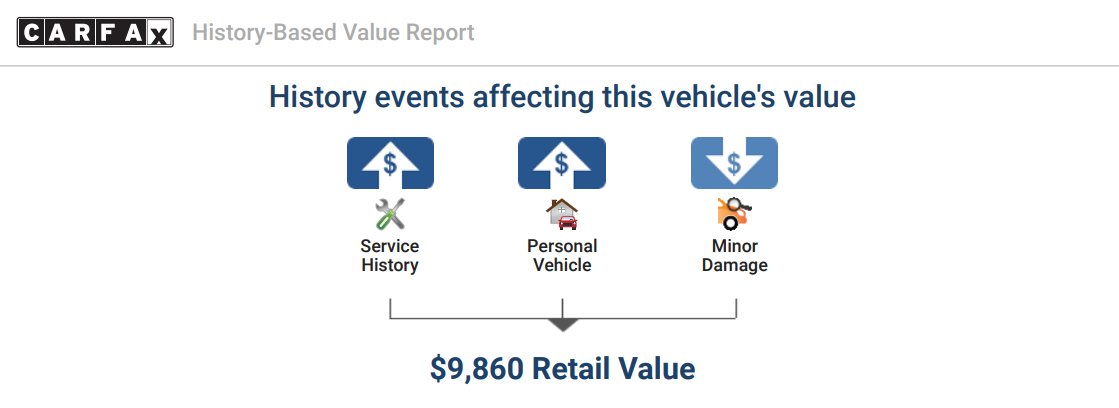
What Is On a CARFAX Report?
A Carfax report includes information on previous owners, body style, engine information, safety options, service and damage history, title information, recall notices, and odometer readings.
A CARFAX Vehicle History Report will display many details of the car, and it will provide you with insight into the car's past. Some examples of items included in the Vehicle History Report include:
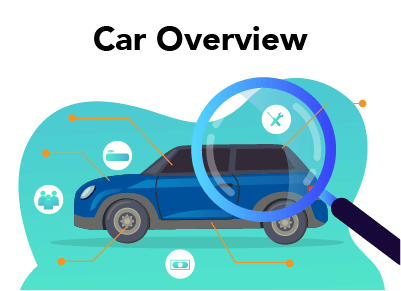 Previous Owners. The number of previous owners.
Previous Owners. The number of previous owners.- Body Style. The body style of the specific vehicle model/make.
- Engine Information. Type of engine in the vehicle.
- Safety Options. Reliability ratings and safety options for the vehicle.
- Service History. This report will give you an idea of how well the vehicle has been maintained and if it's had any major issues.
- Accident History/Damage. The report will show if the vehicle was in any major accidents or experienced flood damage.
- Title Information. Information about the title, including any liens.
- Recall Notices. You'll find out if the vehicle has any open recalls.
- Odometer Readings: The vehicle's most recent odometer reading should match what's on the car.
In this sample CARFAX report, we can see that there is minor damage, 3 previous owners, and the last odometer reading. You can get a more detailed view in the following sections.
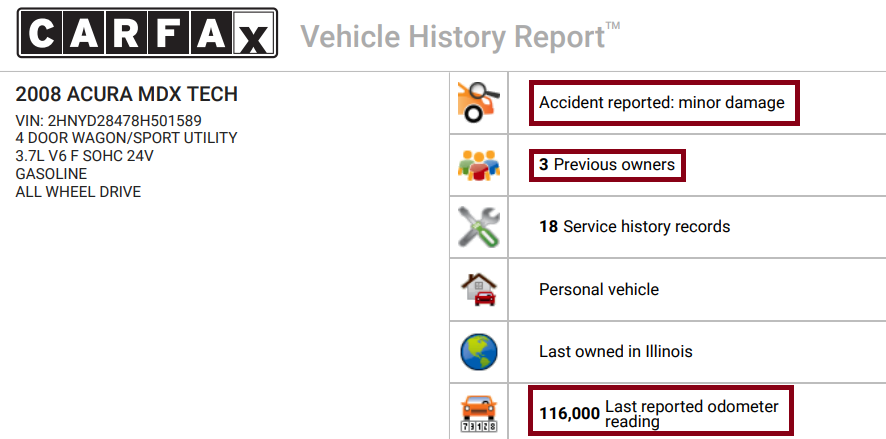
Ownership History
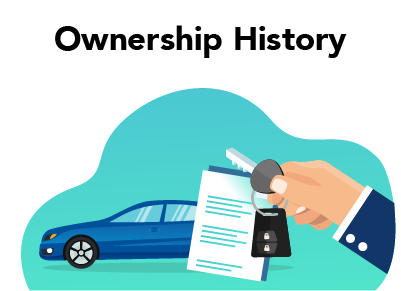 Ownership history is about the vehicle's prior owners. It will tell you how many owners there were and if the car was used for business or personal use. You'll also find out the estimated length of ownership, how many miles were driven per year, and where the vehicle was owned.
Ownership history is about the vehicle's prior owners. It will tell you how many owners there were and if the car was used for business or personal use. You'll also find out the estimated length of ownership, how many miles were driven per year, and where the vehicle was owned.
Pay attention to how the vehicle was used, because if the car was used as a rental or a taxi, it may have experienced a lot of wear and tear.
In this sample CARFAX report, we can see that the vehicle was used for personal use by all three owners.

Title History
 The report will include the title history, including any salvage-title information. A salvage title is used when a car is declared a total loss after a theft or accident and when it's damaged by over 75% of its worth. Not all states permit salvage title vehicles.
The report will include the title history, including any salvage-title information. A salvage title is used when a car is declared a total loss after a theft or accident and when it's damaged by over 75% of its worth. Not all states permit salvage title vehicles.
Even if the vehicle is not salvaged, it may have been rebuilt or have reconstructed parts, and the title history section will disclose this.
You'll also find out if the car has any liens. A lien means that the seller still owes money on the vehicle, so a third party may have the right to repossess if the loan isn't paid back on time. Vehicles with a lien may require permission to sell vehicles. The title report will also show if there were lemon reports or buybacks filed on the vehicle. A buy-back occurs when the manufacturer buys the car back from the owner due to a defect.
Here you can learn about other damage as well, like flood, fire, and hail damage. You can also confirm the vehicle's odometer reading.
Finally, the title history will ensure that the seller is the vehicle owner, so you don't buy a stolen vehicle.
In this sample CARFAX report, we can see that there are no major problems with the title or any major damages.

Additional History
 The Additional History section provides more detailed information on reported damage or accidents. Here you'll find out about total loss, structural damage, airbag deployment, recalls, and basic warranty. This section will also provide information on whether the recalls were completed and the details of the vehicle warranty information. Carefully review this information to determine the integrity of the vehicle.
The Additional History section provides more detailed information on reported damage or accidents. Here you'll find out about total loss, structural damage, airbag deployment, recalls, and basic warranty. This section will also provide information on whether the recalls were completed and the details of the vehicle warranty information. Carefully review this information to determine the integrity of the vehicle.
In this sample CARFAX report, we can see that there were no major issues, but there is minor damage reported on 5/9/2014. You can see more information related to this issue in the Detailed History section.
Detailed History
The Detailed History section outlines every single major event with the vehicle. For example, it shows the maintenance records and recommendations of service throughout the vehicle's history. You will get a timeline of the vehicle's history, including pre-delivery inspections, sales, purchases, service visits, oil changes, and more. This section offers a useful overview of how the vehicle was maintained.
In this sample CARFAX report, we can see the detailed history for "Owner 1". It will also show the detailed history of the other owners as well. It's important to take note of how well the vehicle was maintained.
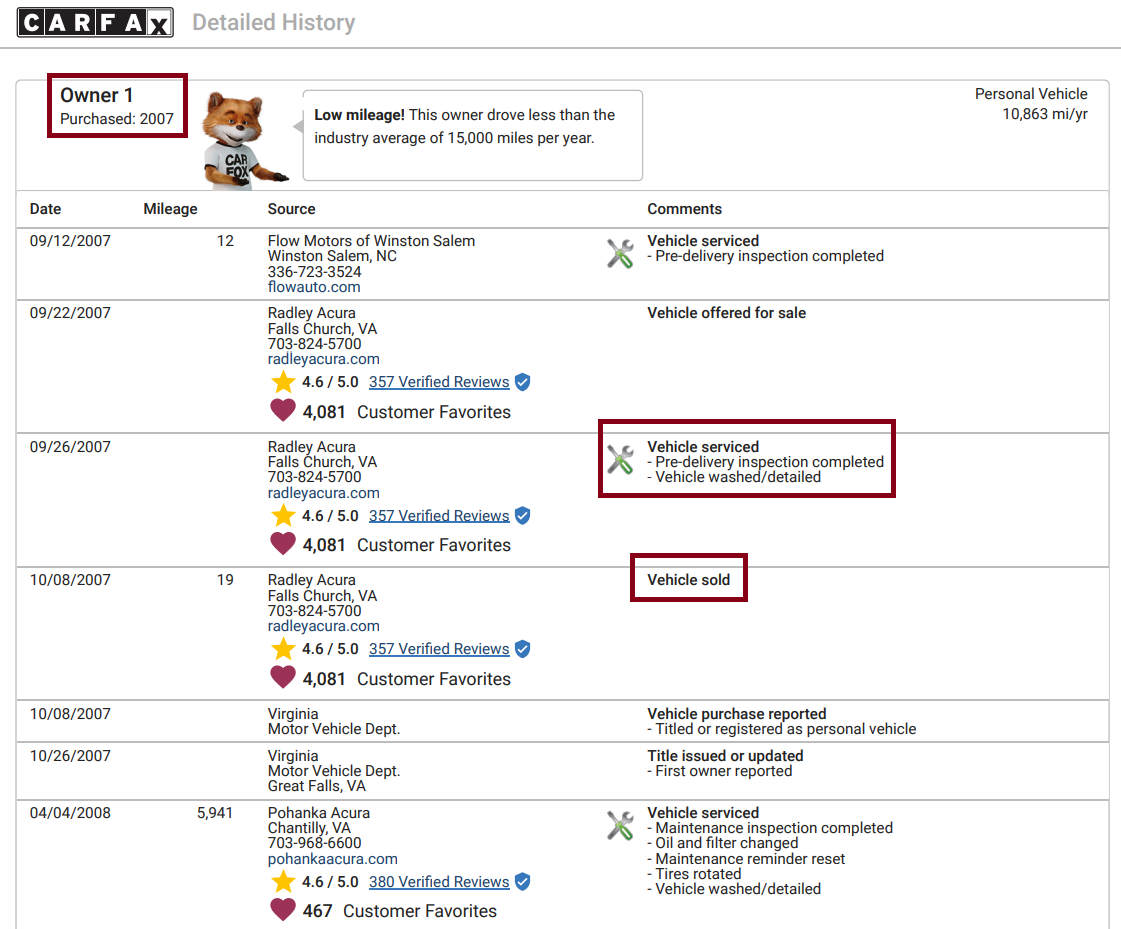
What Are Some Red Flags in a CARFAX Report?
If the report contains any red flags, you should be very cautious about pursuing that vehicle. Here are CARFAX red flags to watch out for:
 Many Owners or Frequent Change in Ownership. If several people are unloading the vehicle within a year or so, there may be a deeper issue with the car. It will often be an expensive or difficult repair issue, so be aware of "hot potato" vehicles with frequent ownership changes.
Many Owners or Frequent Change in Ownership. If several people are unloading the vehicle within a year or so, there may be a deeper issue with the car. It will often be an expensive or difficult repair issue, so be aware of "hot potato" vehicles with frequent ownership changes.- Several Repairs or a Recent Major Repair. Cars with long histories of repairs tend to need more in the future. It suggests that there's still more left to fix and that the car's durability and reliability could be questionable. A huge repair right before trying to sell the vehicle is a big red flag.
- Lack of Repair History. While excessive repairs are concerning, so are none at all (especially for older vehicles). Either the owner did not keep up with repairs, or the repairs weren't reported to CARFAX.
- Emissions Testing Failure. While dealers cannot sell you a car that doesn't pass emissions testing, the same is not true for owners. Steer clear of vehicles with several failed emissions tests and/or no emissions tests within a year.
- The Seller Does Not Match Title Information. The person selling the vehicle should be the same as on the title. A mismatch between the title and seller can suggest a host of issues, like a stolen vehicle.
- Fleet/Rental Vehicles. It's not necessarily terrible to purchase a car formerly used as a fleet, rental, or demo car, but you'll have to consider the potential wear. If the car was a rental, you'll want to have it inspected by a mechanic.
- Salvage/Insurance Loss/Rebuilt. It's important to consider that the car suffered extensive damage at some point, and you'll need to make sure your state allows vehicles with a salvage title before buying.
- Water Damage. Water can cause major problems for cars. Any signs of water damage in the CARFAX report should be a concern, as it often leads to future issues.
- Outstanding Recalls. Recalls are quite normal, but you should be wary if the owner has not taken the time to get them fixed.
What Are Some CARFAX Alternatives?
CARFAX is a commonly used and well-trusted service for vehicle history reports, but it's not the only one. Some top CARFAX alternatives include:
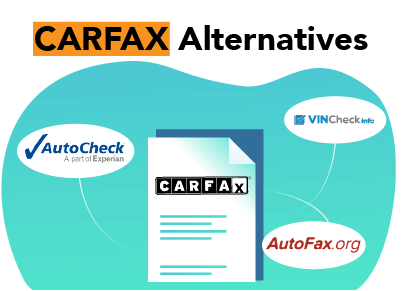 AutoCheck: AutoCheck offers vehicle history reports for much less than CARFAX. You can purchase a single detailed report for $24.99, or search up to 15 vehicles for $49.99. If you only want to view the basics like the engine, model, and country of origin, you can search for free with the license plate number or VIN. Check out our full review and breakdown of AutoCheck.
AutoCheck: AutoCheck offers vehicle history reports for much less than CARFAX. You can purchase a single detailed report for $24.99, or search up to 15 vehicles for $49.99. If you only want to view the basics like the engine, model, and country of origin, you can search for free with the license plate number or VIN. Check out our full review and breakdown of AutoCheck.- VINCheck.info: Vincheck provides a free vehicle history report that includes impounds, towing events, vehicle sales history, and a vehicle theft check. It will also provide you with a market value, and you don't have to register to view this data. You'll also get an inspection checklist to self-inspect the vehicle.
- AutoFax: AutoFax only costs $8.99 for a detailed vehicle report. It will give you the odometer records, past owners, accident history, title status, and flood damage information with a VIN check. They also offer an AuotFax vehicle score based on their inspection.
CARFAX is an excellent resource for vehicle history reports, but it should only be part of your car-buying decision process. A vehicle history report is not an alternative to an inspection, and should only be used to guide your next steps.
Best Car Deals by Category
Frequently Asked Questions
Is CARFAX better than AutoCheck?
CARFAX and AutoCheck are both well-known and trusted vehicle report resources. AutoCheck is slightly less expensive, and it's best known for tracking auction cars. However, CARFAX tends to be more accurate when reporting owner history and verifying mileage.
How much is a CARFAX report?
- 1 report is $39.99.
- 3 reports are $59.99.
- 6 reports are $99.99.
How do I get a free CARFAX report?
CARFAX lists every car for sale on their site with free CARFAX reports, and some other dealers may include a free report with their listings. To get a free CARFAX report, look for car listings that include the link, or request one from the seller.
Can I trust a CARFAX report?
CARFAX reports are trustworthy, but they are limited. Once you've got the report, make sure to self-inspect and test-drive the vehicle. If you are very serious about the purchase, then consider a pre-sale inspection, especially if it's being sold by the owner.
What are some red flags in a CARFAX report?
Some red flags on a report include a vehicle having many owners in the past, lack of repair history, or having major repairs just before selling. Water damage and outstanding recalls are a few more indications that you should avoid the vehicle.
Are CARFAX reports worth it?
While CARFAX reports are costly, they have an excellent reputation. The small investment for a CARFAX report can save you a lot of money down the road by helping you avoid problematic vehicles.
What are some CARFAX alternatives?
Some CARFAX alternatives include AutoCheck, VINCheck, and AutoFax. They might not be as comprehensive and as popular as CARFAX, but they are more affordable options.
Do insurance companies report accidents to CARFAX?
Although some insurance companies will report accidents to CARFAX, it's important to note that not all insurance companies will. So there may be instances when an accident will not show up on the CARFAX report. Even if it is reported, there can be instances when the full details of the accident will not be available.
Do body shops report to CARFAX?
Most body shops will not report any incidents to CARFAX, as it is not required to do so. Even if they do, it will most likely show up in the "Detailed History" section as "vehicle serviced".
Posted in Car Buying Tips |

